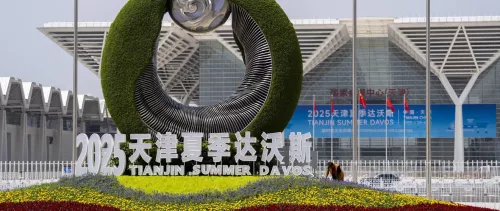
Emerging technologies can bridge the needs of multiple stakeholders. Image: Unsplash/Alex Kotliarsk
- Emerging technologies can help bridge the needs of several stakeholders when it comes to some of the world's most pressing problems.
- Lessons can be found in blockchain, game technology, distributed ledger and other approaches, silos can be broken down to ensure communities, corporations, governments and other relevant stakeholders input into apt solutions.
- Leaders of the World Economic Forum's Innovators Community speak about how new technology can enable multistakeholder collaboration in today's world.
The most pressing global challenges, such as climate change, ageing societies and poverty, require a multistakeholder solution, as no single entity can tackle these complex issues by itself. The multistakeholder approach is particularly important in embracing emerging technologies, as much of their benefits, risks and implications are yet to be surfaced. We asked leaders of the World Economic Forum’s Innovators Community, a group of mission-driven start-ups and Unicorn companies, how emerging technologies enable multistakeholder collaboration in today’s world. This is what they told us.
'The decentralized nature of new applications allows for more transparency, equitability and inclusiveness'
Beryl Li, Co-Founder, Yield Guild Games
We are currently in a historical period of time of the internet – Web 3. Games, finance, governance and reputation are now designed to be decentralized through cryptography, blockchains and smart contracts.
The decentralized nature of new applications allow for more transparency, equitability and inclusiveness. Participants are able to join a game (GameFi) or a finance related activity (DeFi) without having to publicly reveal their gender, enthnicity, or age. Any contributor or member of a decentralized economy can pass proposals and vote on the future of their platform. Games are also able to offer rewards based on a player's skill and reputation. This allows participants to earn over time. As the reputation system grows in Web3, it can be used for other gated activities such as other forms of uncollateralized loans or for getting a credit rating to avail discounts or new airdrops from brands. Security can be tightened by flagging crypto addresses based on dubious on chain activities.
Web3's NFTs and tokens can create a collaborative world by providing new opportunities and new forms of economic value for the have-nots. This is how Web3 enables a multistakeholder world.
'A new approach is rewriting how cyber risks are managed'
Vishaal Hariprasad, Chief Executive Officer, Resilience
With the explosion in the complexity of cyber threats and economic pressures from a potential global recession, even mature organizations are struggling to understand how to invest against new risks to their digital transformation efforts. What's worse is that traditionally decisions around buying insurance, launching new digital systems and securing IT networks are all made by different parts of the business, with independent reporting silos, incentives, and authorities. That is a perfect storm for increasing chaos in cybersecurity efforts that have been losing to cyber criminals; despite rising investment by enterprises in every market segment.
A new approach is rewriting how cyber risks are managed. Advanced data analytics that combines financial loss history, technical cybersecurity vulnerabilities, and risk-based hygiene recommendations can help enterprises make dramatically better decisions about security. This Cyber Resilience approach integrates cyber insurance, cybersecurity visibility, and enterprise risk management into one holistic view. The goal is to break the silos between risk management, information security, and financial leaders to make it easier to invest in security controls and financial risk transfer that protect critical business functions and provide the highest return on investment.
'More empathetic and humane technology will need to be created'
Isaac Castro, Co-Founder and Co-Chief Executive Officer, Emerge
New technological paradigms will emerge due to several years of global pandemic followed by an economic recession that will increase social tension and instability, increase loneliness and disconnection and inevitably impact our people’s mental and physical health due to many new stressors.
A recent National Research Group survey found that 79% of respondents believe that when people can interact physically, they treat each other with greater kindness. In today’s fragmented world, 2 billion adults feel alone. Rates of depression and anxiety climbed globally by more than 25% in recent years, according to WHO.
We need to come back to the roots of what makes us human. More empathetic and humane technology will need to be created. New hardware and platforms such as augmented reality and brain-computer interfaces, disciplines such as art, and senses such as touch will come into play. We’ll redefine social contracts in the virtual world, where emotion, trust and safety become our most important currencies - all in favour of the human being.
'With the ability to take complete control over assets, market participants take on less risk and increase capital efficiency'
Dimitry Tokarev, Chief Executive Officer, Copper
Digital assets and Distributed-Ledger Technology (DLT) are changing the economic landscape regarding how parties agree and trade with one another. The intrinsic design of tokenized money and securities allows for the complete and final ownership of assets removing numerous intermediaries that today’s financial market infrastructure relies on for settlement finality. With the ability to take complete control over assets, market participants take on less risk and increase capital efficiency.
Unlike traditional asset-clearing counterparties, digital asset custodians are the final point of settlement, removing a long custody and payment chain. With the ability to use smart contracts, multiple stakeholders can now remove their systemic risks, with trades being executed only when conditions have been met. That means that DLT systems will allow for greater collaboration between entities as primary risks are subject to prior stipulations. Part and parcel to blockchains are the governance structures that allow multistakeholders to participate in ecosystems’ development and direction. That can be seen from the various public-private projects being tested by Central Banks and financial entities aiming to tackle systemic risks.
'We need to scale existing and new CCS technology fast and in partnership with like-minded industry partners'
Claude Letourneau, President and Chief Executive Officer, Svante
The interdependence of climate technologies – renewables, hydrogen and carbon capture and storage (CCS) – means that scaling them up often requires organizations to work together on building new value chains. First-mover advantages are therefore available to companies that join the climate tech ecosystem early. However, fast followers could struggle to enter such alliances after they take shape. We need to scale existing and new CCS technology fast and in partnership with like-minded industry partners. In the last few years, we have seen several partnerships formed along the value chain of CCS under various channel-to-market business models – engineering or construction project delivery, carbon capture as-a-service and carbon management-as-a-service.
I believe the first movers will be in the industries feeling the most pressure. I come from the power industry and have seen first-hand how the pressure to reduce CO2 emissions has led to irresponsible behaviour by policy leaders who have forced the closing of economic and reliable facilities providing hundreds of direct jobs and supporting communities of thousands. That’s real – not just some CEO getting pressure at the country club because of an environmental, social, and corporate governance (ESG) score. So, we will see that most megaprojects will come from the energy industry, meaning power, refining, hydrogen, petrochemicals etc.
'Improving the ability of the private and public sectors to collaborate more effectively'
Tom Parker, Founder and Chief Executive Officer, Hubble Technology
Cloud-based technologies are improving the ability of the private and public sectors to collaborate more effectively in addressing cyber threats with more speed and precision. There are many examples where this increased velocity of information sharing has saved organizations from significant business impacts while enabling an enhanced state of preparedness and overall business resiliency.
'We now see more purpose-driven organizations embracing online marketplaces for good'
Rachel Romer, Chief Executive Officer and Co-Founder, Guild Education
Technology platforms and online marketplaces are bringing together stakeholders for real-time collaboration as never before. While the earliest applications of matching technology for marketplaces were applied for commercial purposes at companies like Uber and eBay, we now see more purpose-driven organizations embracing online marketplaces for good.
At Guild, for instance, we are bringing together employed adult learners through their employer-sponsored benefits to access learning providers via our Career Opportunity Platform. When these workers come to Guild, they find access to online education, coaching and career mobility pathways that translate to successful outcomes for employees, employers and their communities.
'Nowadays, each industry has platforms billions of people use to shop, order taxis, book doctors, and much more'
Beth Ann Lopez, Co-Founder and Chief Executive Officer, Docosan
New technologies are indeed revolutionizing how people collaborate. I would argue this is chiefly happening through online platforms. Nowadays, each industry has platforms billions of people use to shop, order taxis, book doctors, and much more. These platforms do not destroy small businesses. Rather, they help them expand their customer base while helping users transparently view and buy whatever is the best option for them and their families.
Platforms are changing the world for the better but huge industries (like healthcare) still lack comprehensive platforms that give people the best possible choices. Emerging markets, in particular, need such platforms, given how difficult and opaque systems can be to navigate there. That's why I started Docosan. It's a healthcare marketplace tailored to emerging markets where patients can quickly discover thousands of doctors, vetted reviews and home treatments without having to deal with long waiting times or sketchy unlicensed providers.
Without the internet or widespread smartphone penetration, such platforms and levels of collaboration would be impossible.
'Complex algorithms are bringing shippers and carriers together to keep trucks full and on the most efficient routes'
Oren Zaslansky, Founder and Chief Executive Officer, Flock Freight
Technology is thus helping entire industries use data to rethink their carbon-intensive processes. Take our supply chain, for example. America’s trillion-dollar freight trucking transportation sector is a leading producer of emissions – but not just because trucks are burning massive amounts of diesel to ship goods. Many trucks burn diesel just to ship air because businesses purchase entire trucks even when they can’t load them to capacity.
With freight pooling technology, we can find and fill those empty spaces. Complex algorithms are bringing shippers and carriers together to keep trucks full and on the most efficient routes. That offers better bottom-line incentives for every stakeholder while reducing carbon emissions by 40%. The future of shared truckload technology finally enables the collaboration we need to build a smarter, more sustainable supply chain.


